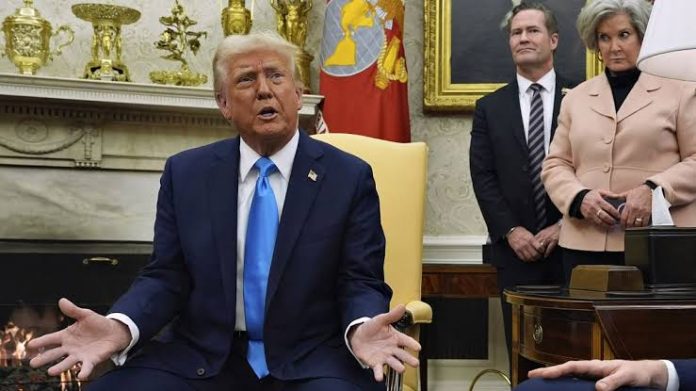Facebook Twitter (X) Instagram Somali Magazine - People's Magazine
Egyptian President Abdel Fattah el-Sisi has firmly rejected U.S. President Donald Trump’s proposal to take over Gaza and relocate Palestinians to Egypt and Jordan. The controversial plan, which has sparked outrage across the Arab world, has placed Egypt in a difficult diplomatic position as it balances regional stability, economic concerns, and its longstanding role as a mediator in the Israeli-Palestinian conflict.
During a recent meeting between Jordan’s King Abdullah II and Trump, discussions centered on the future of Gaza, with Trump suggesting an American-led intervention that would involve expelling Palestinians from the enclave. The proposal was met with immediate resistance, with King Abdullah making it clear that Arab nations were formulating an alternative plan to rebuild Gaza without displacing its people. Egypt soon followed with an official statement confirming its commitment to preserving Palestinian territorial integrity while supporting reconstruction efforts.
Trump’s threats to withhold U.S. aid to Egypt if it does not comply have only heightened tensions. Egypt, which has received more than $85 billion in U.S. bilateral assistance since 1946, remains heavily reliant on American financial and military support. In 2023 alone, it was the fifth-largest recipient of U.S. foreign aid, with $1.45 billion allocated, most of it directed toward its military. However, while economic aid is crucial, Egypt’s internal stability is just as important. Accepting a forced displacement of Palestinians could spark domestic unrest, as support for the Palestinian cause has historically played a significant role in Egyptian political movements.
Political analysts warn that Trump’s insistence on his plan could jeopardize Egypt’s diplomatic standing and its agreements with international partners. Cairo is now working closely with other Arab states to present a counterproposal that ensures Gaza’s reconstruction without mass displacement. King Abdullah has already committed Jordan to accepting 2,000 injured Palestinian children, and Egypt is expected to expand its humanitarian efforts, treating more wounded civilians in its hospitals. The country has already been providing medical aid since the start of the war and will likely continue to do so as conditions worsen.
Despite economic struggles, Egypt is also positioning itself as a key player in Gaza’s reconstruction. Egyptian construction companies are prepared to participate in rebuilding efforts, with major developers already discussing large-scale projects. Real estate tycoon Hisham Talaat Moustafa recently revealed that he has been working on a plan involving 40 to 50 construction firms from Egypt and other countries, ensuring that Gaza can be rebuilt without displacing its residents. However, financial constraints mean that Egypt will need external funding, particularly from Gulf nations.
Gulf Cooperation Council (GCC) members, including Saudi Arabia, Qatar, and the UAE, have already pledged significant aid to Gaza. Since October 2023, these nations have collectively contributed $650 million in humanitarian assistance. However, the scale of destruction in Gaza requires far more. Israel has made it clear that it will not contribute financially to reconstruction efforts, placing the burden on regional partners and the broader international community.
Egypt’s rejection of Trump’s plan is not only about regional diplomacy but also about preventing future conflicts. President el-Sisi is particularly concerned about a scenario similar to Lebanon, where Israeli military interventions were justified by Palestinian militant activities. Allowing forced displacement could create a long-term security crisis on Egypt’s borders, potentially leading to further instability.
For now, el-Sisi has reportedly refused to engage in any White House discussions until Trump retracts his proposal. This decision reflects Egypt’s broader strategy of working with Arab nations to present a unified front against forced displacement while securing financial support for reconstruction. The coming weeks will be crucial as Egypt and its allies push for a sustainable solution that addresses both humanitarian and political concerns.
As tensions rise and international pressure mounts, the future of Gaza remains uncertain. The rejection of Trump’s plan by Egypt and Jordan signals a growing resistance to external interference in Palestinian affairs. With an emergency Arab summit on Gaza scheduled for February 27, regional leaders are racing against time to establish a viable path forward. The world is watching closely as Egypt navigates this complex crisis, balancing its economic challenges, diplomatic alliances, and commitment to Palestinian sovereignty.

